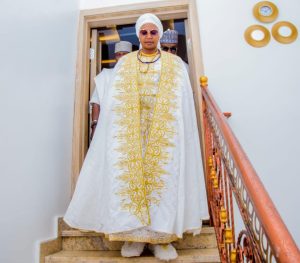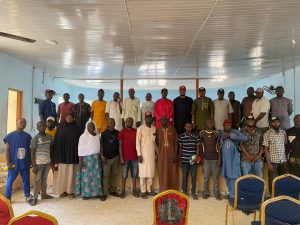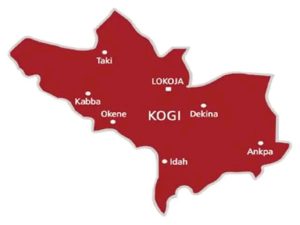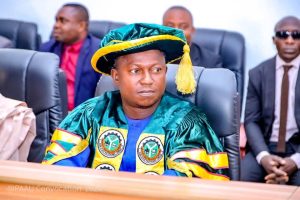#Emilokan: The kingmaker who became king

Former Lagos State Governor, Asiwaju Bola Tinubu, was at dawn on Wednesday, declared the winner of last Saturday’s presidential poll. ADELANI ADEPEGBA and ADEBAYO FOLORUNSHO-FRANCIS write on the politics of the kingmaker who is set to become Nigeria’s 16th president on May 29
The All Progressives Congress standard bearer, Asiwaju Bola Tinubu, was in the early hours of Wednesday declared the winner of last Saturday’s presidential election by the Independent National Electoral Commission.
According to the commission, Tinubu scored 8,794,729 and got the required 25 per cent in 30 states to defeat his major opponents, Atiku Abubakar of the Peoples Democratic Party, who came second with 6,984,520 votes and followed by Peter Obi of the Labour Party who scored 6,101,533 votes.
Before the declaration, the former Lagos State governor was handed a stunning defeat in his home base of Lagos by the LP candidate, Peter Obi. Tinubu suffered what amounted to his very first political loss since 1999 when he has been dominating the politics of the state.
Tinubu has never hidden his ambition to lead the country. Despite the political hurdles on his way, the cloud of controversies surrounding his birth and education, his rumoured wealth believed to be steeped in corruption, his alleged stranglehold on Lagos politics and finance, public worries over his health and doubts about his fitness for the most demanding job in the land, the ex-Lagos governor has instead used the bricks and stones thrown at him to build a ladder to his dream job.
Those who knew Tinubu, who was Lagos State governor between 1999 and 2007 on the platform of the Alliance for Democracy, said he prepared for the arduous walk to the Presidency long ago. While his contemporaries were content to retire to the Senate or to a mansion in the United States or a luxury villa in a Caribbean paradise after leaving office, the Jagaban Borgu was building political alliances across the country. He was rumoured to have contributed to the election of many state governors who returned the favour by supporting his presidential ambition.
Tinubu forged his political dynasty during the tough Olusegun Obasanjo Presidency when the Federal Government seized the allocation meant for the Lagos local government areas over the state’s right to create local council development areas. Pushed to the wall by the FG’s hostility, Tinubu was compelled to evolve ingenious ways to keep the local governments afloat by devising policies to shore up the state’s revenue. His successor, Babatunde Fashola, would go further to expand the tax net and strengthen the state fiscally.
But Tinubu’s traducers are quick to point to the alleged shady deals between his tax consultancy firm, Alpha Beta and the Lagos State government. Alpha-beta is a consulting firm that has an exclusive right to collect tax on behalf of Lagos State.
In an interview with a newspaper, the pastor of the Citadel Global Community Church, Tunde Bakare, while acknowledging the President-elect’s remarkable political sagacity, noted how he allegedly bankrolled ex-governors Kayode Fayemi of Ekiti, Ibikunle Amosun (Ogun), Rauf Aregbesola (Osun), including the late governor Abiola Ajimobi of Oyo State.
“You see, there are some things that Tinubu has done. How he fought the PDP from capturing the whole of South-West is remarkable. And how he used whatever resources he was getting, either from Alpha Beta or any other source, to secure Ogun, Oyo, Ekiti, Osun and even Edo. Remarkable,” he said with grudging respect.
His opponents also frowned on his grip of Lagos and how, like a feudal lord, he determines who governs the state. His refusal to support Governor Akinwunmi Ambode’s second term rankled many Nigerians who believe this was at variance with his touted democratic credential.
Although his dates of birth, ancestry and early education have been shrouded in mystery, available information from his affidavits stated that he was born on March 29, 1952. His mother, Abibatu Mogaji, was a trader who subsequently became the Iyaloja of Lagos State.
In 1975, he travelled to the United States to study at Richard J. Daley College in Chicago before proceeding to Chicago State University, where he earned a Bachelor of Science in Accounting in 1979.
In the US, Tinubu joined American companies Arthur Andersen, Deloitte, Haskins, & Sells, and GTE Services Corporation. He also worked with the oil giant, Mobil.
Tinubu began building what would later become a school of thought modelled after the ideology of the late sage and leader of the old Western region, Chief Obafemi Awolowo. He began his political career in 1992 when he joined the Social Democratic Party as a member of the Peoples Front faction led by Shehu Musa Yar’Adua. Other members of the faction included prominent politicians such as Umaru Yar’Adua, Atiku Abubakar, Baba Gana Kingibe, Rabiu Kwankwaso, Abdullahi Aliyu Sumaila, Magaji Abdullahi, Dapo Sarumi and Yomi Edu.
Tinubu would go on to form the Action Congress which later metamorphosed into the Action Congress of Nigeria- a merger of a faction of AD, Advance Congress of Democrats, and several other minor political parties in September 2006.
In February 2013, the party merged with the Congress for Progressive Change, the All Nigeria Peoples Party, and the All Progressives Grand Alliance to form the APC as a strong opposition to the ruling Peoples Democratic Party and All Nigeria Peoples Party. Lagos, Edo, Ekiti, Kogi, Ondo, Bauchi, Plateau, Niger, Adamawa, Oyo and Osun states accounted for the party’s presence and power base.
By 2007, Atiku Abubakar had fallen out with Obasanjo over his plan to succeed his principal and his opposition to Obasanjo’s third-term agenda. The disagreement later forced Atiku to defect to the Action Congress from the PDP. Atiku eventually lost the presidential election to PDP’s Umaru Musa Yar’Adua after coming third while Muhammadu Buhari of the ANPP came second.
However, plans by Tinubu to run for the presidency with Atiku in 2007 were shot down by the former vice president who believed that a Muslim-Muslim ticket would not fly. A former National Chairman of the AC and ex-interim Chairman of the APC, Chief Bisi Akande, who revealed this in his autobiography, ‘My Participations,’ said though the party settled for Ben Obi as Atiku’s running mate, it could have been Tinubu.
Narrating how Tinubu lost the vice president’s slot, he stated, “In 2007, we formed a party, the AC, with Abubakar Atiku. We agreed that Atiku should be our presidential candidate and we had the understanding that he would run with Bola Tinubu. I was the chairman of the AC.
‘’One day, after we had nominated Atiku as our presidential candidate, one young man came and gave me a form from INEC. I told him I could not sign a blank form and that I, as the chairman, must know the name that would be filled in it. The young man, Bashir Yusuf Ibrahim, must have been the organising right-hand man of Atiku. He was an active person from Kano.
‘’The following morning, he came again with Lawan Kaita. Kaita begged me and said it was Ben Obi whom Atiku had chosen as his running mate behind our backs. So, I signed the form because I believed, as the candidate, Atiku had the right to choose his running mate. If I refused to sign, that would create a crisis.
“We believed that Atiku should have chosen his running mate from the AD even if he was no longer favourably disposed to Tinubu. With Atiku, the party would be strong in the North, but because of the preponderance of the PDP in the South-East and the South-South, it would face more resistance in that area.
‘’Obasanjo was stepping down from the Presidency. Therefore, the Yoruba, even the few that benefited from his arrogant rule, would no longer be obliged to vote for the PDP.
“Segun Osoba, Niyi Adebayo and Lam Adesina had earlier met Atiku and we proposed to him our choice of Tinubu, and he promised to come back to us. He gave us a date. On that date, we all assembled. Atiku came with Audu Ogbe, Tom Ikimi and Usman Bugaje.
“We proposed that Tinubu should be the running mate, though Tinubu was not at the meeting. Atiku would not give us an immediate answer. He said he wanted to have more consultations.
“Ikimi, Ogbe and others were all very strong against Tinubu, because they said it would mean a Muslim-Muslim ticket. We deadlocked over that. Atiku never said anything. We left the meeting. What prompted us was that anytime we said we needed money, Atiku would say ‘Bola, please help us’. Bola was the only one spending the money among us. The rest of us were poor.
‘’Tinubu also put all his energy and resources into the formation of the AC and we felt he deserved a spot on the ticket. We discussed with Bola on this and he said we should discuss it with Atiku. It was after we were deadlocked that they brought me the blank form. So, Atiku ran with Obi and failed. Only Lagos State from the South West voted for Atiku in all the states of Nigeria.”
Undeterred by his loss of the vice presidential ticket, the APC strongman also attempted to run alongside Buhari in the 2015 presidential election but failed again.
An authorised biography of President Buhari revealed how he chose Vice President Yemi Osinbajo as his running mate for the 2015 presidential election despite Tinubu’s opposition. The book, ‘Muhammadu Buhari: The Challenges of Leadership in Nigeria,’ was written by Prof. John Paden.
Paden wrote, “With Buhari coming from the North-West geopolitical zone, the vice presidency had been ceded to the South-West geopolitical zone. Tinubu, a former governor of Lagos State and political ‘godfather’ of the South-West geopolitical zone, felt he should be the vice presidential candidate.
“His protégée and the then popular Governor of Lagos State, Babatunde Fashola, was also a possible candidate. Both Tinubu and Fashola were Muslims, which complicated the national balance.
“A third candidate, Yemi Osinbajo, had been Attorney General of Lagos State and a senior law professor and a pastor. When the three names were forwarded to Buhari, he chose Osinbajo despite enormous pressure from Tinubu.”
But recalling how the Buhari Presidency emerged during the public presentation of the book in October 2016, Tinubu said Osinbajo was named Buhari’s running mate because of the need for “a religiously-balanced ticket given the sensitiveness of the moment.”
In the run-up to the APC presidential primary election last year, Tinubu cried out over what he felt was an attempt to edge him out of the presidential race.
Speaking in Abeokuta, Ogun State, he revealed how he helped Buhari to become President, blurting out his now famous quote, “emilokan” (It’s my turn).
“It is my time. I’m educated. I’m experienced. I have been serving people for a long time. Bring me the presidency, it is my turn,’’ he insisted stridently.
In reaction to the new naira scarcity and fuel shortage which provoked riots across the country, Tinubu accused unnamed powerful persons of masterminding the crisis to shoot down his aspirations. His ally, Governor Nasir El-Rufai, affirmed that some Presidency officials, including the Central Bank Governor, Godwin Emefiele, were working against Tinubu.
To demonstrate his support for the APC candidate, however, Buhari not only campaigned for him in some states, but he also violated the Electoral Act by displaying his ballot paper after voting. Having survived several political wars, it remains to be seen whether the Lagos ‘godfather’ would survive the looming legal battles against his mandate. Until then, Tinubu has made history as Nigeria’s political kingmaker set to become a king himself.




